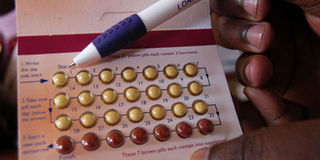Child planning and spacing beneficial

A pharmacist displays birth control pills in Nyeri on September 1, 2010. Kenyans seeking family planning services face high social and cultural barriers. PHOTO | JOSEPH KANYI | NATION MEDIA GROUP
What you need to know:
- Child planning allows individuals and couples to anticipate and attain their desired number of children.
- It improves women’s opportunities for education, employment, and full participation in society.
Recently, several prominent personalities, including Kilifi gubernatorial aspirant Kazungu Kambi, have been reported telling crowds at political gatherings to “multiply and fill the earth”.
This is not the first time that a public figure has made such a statement.
No less than five members of the National Assembly have been quoted in the media, encouraging their constituents to have more children so that their communities can capture leadership or get a bigger allocation of resources.
CASH REWARDS
Many of them have been encouraging their audiences to stop using contraceptives and give birth to many children to boost their voting numbers.
Some, including a Cabinet secretary, have even gone to the extent of offering cash rewards for every birth or pregnancy.
Regrettably, the message by these prominent personalities is very compelling. It makes sense to many.
ELECTIONS SEASON
This especially so, with the thinking behind the so-called tyranny of numbers.
Many Kenyans will take this message seriously, and some will act on it.
This being the election season, chances are that many more politicians and other prominent personalities will say similar things and take similar actions (of rewarding pregnant women).
FAMILY PLANNING
However, data shows that child planning and spacing is beneficial to women, families, communities and the country.
It allows individuals and couples to anticipate and attain their desired number of children.
Anticipating, spacing and timing the birth of children has many proven benefits.
One of the most vital rewards is that it protects the health of women and children by reducing high-risk pregnancies and allowing ample time between them.
ECONOMIC GROWTH
This is especially important for Kenya, which is walking the path of reducing maternal and child deaths.
Child planning and spacing also reduces poverty by contributing to economic growth at the family, community, and national levels.
It improves women’s opportunities for education, employment, and full participation in society.
This also enables girls and women to achieve their ambitions.
Whether in school, formal or informal occupations, women who have the benefit of choosing when to have children, how many to have and how much time between each child, are likely to do better in life.
HEALTH CARE
Studies have shown that women who have the ability to plan their children alongside their individual and family aspirations are able to go to school, make better and higher incomes and participate in shared activities in their communities.
All these benefits not only accrue to the woman, but also her partner, her family and her community.
Child planning and spacing leads to savings in the cost of health care services.
Families are able to care for their children, feed, house, clothe and educate them better.
This reduces the burden on public amenities — health, water and sanitation — as well as education.
ACCESS TO INFORMATION
However, Kenyans seeking family planning services face high social and cultural barriers.
We must not muddy the conversation with misinformation.
We must continue to invest resources in quality family planning services at public health facilities to ensure that women (and their partners) who need it can access it.
Over the past 20 years, we have made good progress, which we need to keep up.
FACTUAL INFORMATION
By investing more in public education, we can ensure that all have the right information.
This will help to dispel myths and misconceptions on family planning.
The media must also refrain from providing platforms to politicians and other prominent personalities to misinform Kenyans about the benefits of child planning and spacing.
Ms Samba is the Kenya country director at Deutsche Stiftung Weltbevoelkerung (DSW). [email protected]




